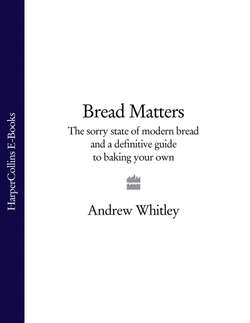Читать книгу Bread Matters: The sorry state of modern bread and a definitive guide to baking your own - Andrew Whitley - Страница 9
Respect
ОглавлениеBritish industrial bread commands little respect. This isn’t surprising when it is promoted with such mixed messages. Some loaves, described as having ‘premium’ qualities, seem barely distinguishable from others being sold at less than the price of a postage stamp. ‘Healthy-eating’ brands, adorned with images of nature and vitality, make detailed claims about the virtues of this or that added nutrient. But the big bakers keep quiet about nutrition when pushing their ‘standard’ loaves, which still account for over half of the market and are sold on price alone.
You might think that keeping prices down would be a good way to increase sales. But with bread, low cost and low quality have become so intertwined that conventional economics are turned on their head.
‘The Irish bread industry is driven by spread sheets and low prices,’ commented Derek O’Brien, head of the National Bakery School in Dublin, in 2004. ‘We produce some of the least expensive bread in Europe. But the result? Our bread consumption is one of the lowest in Europe. This is an appalling situation, particularly for the remaining number of smaller bakers, because their future is to a great extent dictated by the industrial baker.’
Many small bakers in the UK would recognise this situation. When low cost becomes below cost, an unseemly race to the bottom is inevitable. In the late 1990s I was told by the chief bakery buyer of one of Britain’s leading supermarkets that the cost of reducing the price of a standard 800g loaf of white sliced bread from 17p to 7p (in line with her main competitor) would be £400,000 a week – a sum that might have been better invested in promoting good food. Two of the main bakeries supplying the cheapest ‘value’ bread went spectacularly bust in 2004-5. Since then, the remaining large bakers have had some success in moving away from low-cost bread and even the supermarkets seem to have realised that loss-leading with something as vital as bread does them little credit. But it will take more than clever branding or a little soya, linseed and omega-3 to dispel the prevailing image of British bread culture as one dominated by pap.
If that seems a harsh judgement, take a look at what actually goes into your daily bread.
